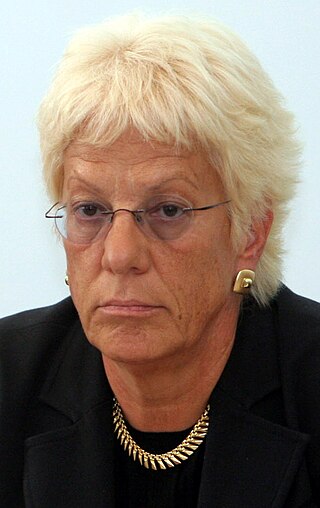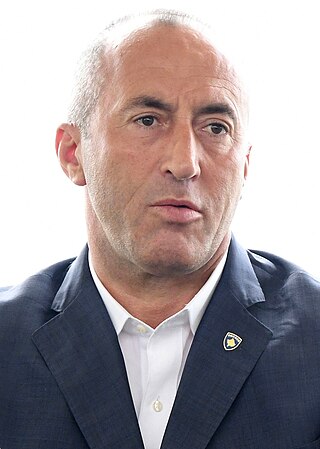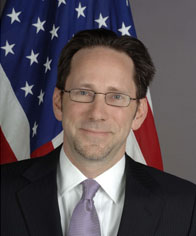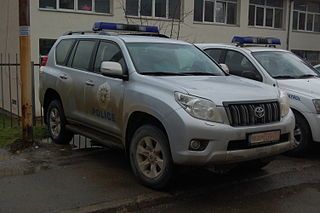
The International Criminal Tribunal for the former Yugoslavia (ICTY) was a body of the United Nations that was established to prosecute the war crimes that had been committed during the Yugoslav Wars and to try their perpetrators. The tribunal was an ad hoc court located in The Hague, Netherlands.

The United Nations Interim Administration Mission in Kosovo is the officially mandated mission of the United Nations in Kosovo. The UNMIK describes its mandate as being to "help the United Nations Security Council achieve an overall objective, namely, to ensure conditions for a peaceful and normal life for all inhabitants of Kosovo and advance regional stability in the Western Balkans."

The Kosovo Liberation Army was an ethnic Albanian separatist militia that sought the separation of Kosovo, the vast majority of which is inhabited by Albanians, from the Federal Republic of Yugoslavia (FRY) and Serbia during the 1990s. Albanian nationalism was a central tenet of the KLA and many in its ranks supported the creation of a Greater Albania, which would encompass all Albanians in the Balkans, stressing Albanian culture, ethnicity and nation.

Carla Del Ponte is a Swiss former Chief Prosecutor of two United Nations international criminal law tribunals. A former Swiss attorney general, she was appointed prosecutor for the International Criminal Tribunal for the former Yugoslavia (ICTY) and the International Criminal Tribunal for Rwanda (ICTR) in August 1999, replacing Louise Arbour.
The politics of Kosovo takes place in a framework of a multi-party parliamentary representative democratic republic, whereby the President (Presidenti) is the head of state and the Prime Minister (Kryeministri) the head of government. Parliamentary elections are held every four years, the most recent in 2021.

Ramush Haradinaj is a Kosovo Albanian politician, leader of the AAK party, and the third prime minister of Kosovo. He is a former officer and leader of the Kosovo Liberation Army (KLA), and previously served as Prime Minister of Kosovo between 2004 and 2005.

Dick Marty was a Swiss politician and state prosecutor of the canton of Ticino. He was a member of the Swiss Council of States and of the Parliamentary Assembly of the Council of Europe.

United Nations Security Council resolution 1244, adopted on 10 June 1999, after recalling resolutions 1160 (1998), 1199 (1998), 1203 (1998) and 1239 (1999), authorised an international civil and military presence in the Federal Republic of Yugoslavia and established the United Nations Interim Administration Mission in Kosovo (UNMIK). It followed an agreement by Yugoslav President Slobodan Milošević to terms proposed by President of Finland Martti Ahtisaari and former Prime Minister of Russia Viktor Chernomyrdin on 8 June, involving withdrawal of all Yugoslav state forces from Kosovo.

Joint criminal enterprise (JCE) is a legal doctrine used during war crimes tribunals to allow the prosecution of members of a group for the actions of the group. This doctrine considers each member of an organized group individually responsible for crimes committed by group within the common plan or purpose. It arose through the application of the idea of common purpose and has been applied by the International Criminal Tribunal for the former Yugoslavia (ICTY) to prosecute political and military leaders for mass war crimes, including genocide, committed during the Yugoslav Wars 1991–1999.
Bajram Kelmendi (1937–1999) was an ethnic Albanian lawyer and human rights activist in Kosovo, Yugoslavia.

John Clint Williamson is an American diplomat, lawyer, and educator who has served in a variety of senior-level roles with the United States Government, the United Nations, and the European Union. He currently serves as the Senior Director for International Justice at Georgetown University, on a joint appointment between the Law Center and the Department of Government. Ambassador Williamson heads the US Department of State-funded project at Georgetown that provides support to the Ukrainian government in its investigation and prosecution of crimes arising from the current conflict. He is the Lead Coordinator of the Atrocity Crimes Advisory Group (ACA), the agreed trans-Atlantic community mechanism for addressing atrocity crimes in Ukraine. In this capacity he coordinates, on behalf of the EU, UK and US governments, the work of the five implementing entities that comprise ACA.
Chuck Sudetic is a former writer and journalist from the United States whose work focused mainly on the lands and peoples of the now defunct country of Yugoslavia. He has written extensively on the Srebrenica massacre of 1995, international war-crimes prosecution efforts after the Balkan conflicts of the 1990s, and life from the fifth century B.C. to the present day in and around what is now the seaside town of Dubrovnik. Sudetic also wrote on the Roma of Europe, mass rape in the Democratic Republic of Congo, and crime in New York City.
Lapušnik prison camp was a detention camp that was operated by the Kosovo Liberation Army, an Albanian militant organization, near the city of Drenas in central Kosovo during the Kosovo War. It was operational in early 1998 and inmates were subject to intimidation, imprisonment, violence and murder. The victims were both Serbs and Albanians.

Numerous war crimes were committed by all sides during the Kosovo War, which lasted from 28 February 1998 until 11 June 1999. According to Human Rights Watch, the vast majority of abuses were attributable to the government of Slobodan Milošević, mainly perpetrated by the Serbian police, the Yugoslav army, and Serb paramilitary units. During the war, regime forces killed between 7,000–9,000 Kosovar Albanians, engaged in countless acts of rape, destroyed entire villages, and displaced nearly one million people. The Kosovo Liberation Army has also been implicated in atrocities, such as kidnappings and summary executions of civilians. Moreover, the NATO bombing campaign has been harshly criticized by human rights organizations and the Serbian government for causing roughly 500 civilian casualties.

Kosovo within communist Yugoslavia had the lowest rate of crime in the whole country. Following the Kosovo War (1999), the region had become a significant center of organized crime, drug trafficking, human trafficking and organ theft. There is also an ongoing ethnic conflict between Kosovar Albanians and Kosovan Serbs. The large Kosovar diaspora which had built up in Western Europe during the 1990s, combined with the political instability, created ideal conditions for Kosovo to become "Europe's crime hub"; well into the 2000s, Kosovo remained associated with both ethnic conflict and organized crime. A Kosovo Police service has been built up under UN administration, beginning in 1999. It had an operational force of 7,000 officers in 2004, and further expanded to 9,000 by 2010. The deplorable crime rate led to an additional deployment of civilian law enforcement resources of the European Union to Kosovo, under the name of European Union Rule of Law Mission in Kosovo in 2008. Originally scheduled for two years, the duration of the deployment was extended twice, as of September 2012 scheduled to last until 2014.

The war crimes trial of Slobodan Milošević, the former President of the Federal Republic of Yugoslavia, at the International Criminal Tribunal for the former Yugoslavia (ICTY) lasted for just over four years from 2002 until his death in 2006. Milošević faced 66 counts of crimes against humanity, genocide, and war crimes committed during the Yugoslav Wars of the 1990s. He pleaded not guilty to all the charges.
The Dubrava Prison massacre was the war time killing of at least 99 Kosovo Albanian prisoners and the wounding of around 200 more in the Dubrava Prison, in north-western Kosovo between 22 and 24 May 1999.

Vladimir Lazarević is a Serbian colonel general of the Third Army Corps, and later the commander of the Priština Corps of the Federal Republic of Yugoslavia. He was indicted by the International Criminal Tribunal for the former Yugoslavia 2003 and was convicted in 2009 of command responsibility for war crimes against Kosovo Albanians during the Kosovo War.
War crimes witnesses to the Kosovo War (1998–99) have been victims to threats, violence, and murder. Those who spoke out about the abuses of their side in the conflict were seen as traitors to their community, and therefore, only a few became witnesses in war crime trials. The international institutions ICTY, UNMIK and EULEX, and national courts in Serbia and Kosovo, have all had problems in ensuring safety for testifying protected witnesses. According to observers, one of the main reasons that the Kosovo Relocated Specialist Judicial Institution will partly operate outside Kosovo is the past failures of the international institutions to protect witnesses.
Petar Jojić is a Serbian politician. He has served several terms in the National Assembly of Serbia as a member of the far-right Serbian Radical Party and was justice minister for the Federal Republic of Yugoslavia from 1999 to 2000.












